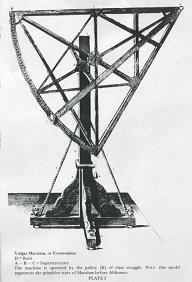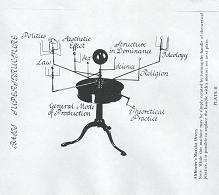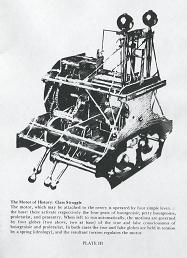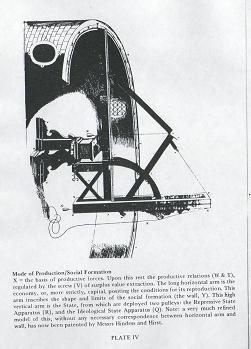The poverty of criticismBookmark notes on Thompson's critique of Althusser in The Poverty of Theory |
||
Page |
Text quotes
or summary |
Comments |
| / | By way of introduction
to the subject, Thompson' throws out this comment from the neo-Althusserians,
Hindess and Hirst:
“Marxism as a theoretical and a political practice gains nothing from its association with historical writing and historical research. The study of history is not only scientifically but also politically useless” |
N.B. These 4 images are drawings included in The Poverty of Theory designed to belittle Althusser's scientism and positivism. Click on any image to see all 4 images large scale. |
| 4 | Thompson claims that Althusser rejects '...entire tradition of substantitve Marxist historical and political analysis.' "I will argue the following propositions, and examine them in sequence. 1) Althusser's epistemology is derivative from a limited kind of academic learning-process, and has no general validity; 2) As a result he has no category (or way of handling) 'experience' (or social being's impingement upon social consciousness); hence he falsifies the 'dialogue' with empirical evidence inherent in knowledge production, and in Marx's own practice, and thereby falls continually into modes of thought designated in the Marxist tradition as 'idealist'; 3) In particular he confuses the necessary empirical dialogue with empiricism, and consistently misrepresents (in the most naiveways) the practice of historical materialism (including Marx's own practice); 4) The resultant critique of 'historicism' is at certain points _identical_ to the specifically anti-Marxist critique of historicism (as represented by Popper), although the authors derive from this opposite conclusions." |
|
| 6 |
Althusser is criticised for having no theoretical categories for handling experience. Thompson identifies ageneric Althusserianismwith the critique of historicism put forward by Popper. It is a structuralism of ‘stasis’ and has no theory of ‘contradiction, ‘change’ nor ‘class’. Althusser constantly 'confuses and conflates the empirical mode (or techniques) of investigation with the quite different ideological formation, empiricism…” Contains a reference to Lenin in Materialism and Empirio Criticism (external text link) to the question of the adequacy of the object of knowledge. |
|
| -7 | "In the old days
(one supposes), when the philosopher, labouring by lamp-light in his study,
came to this point in his argument, he set down his pen, and looked around
for an object in the real world to interrogate. Very commonly that object
was the nearest one to hand: his writing-table. 'Table', he said, 'how do
I know that you exist, and, if you do, how do I know that my concept, table,
represents your real existence?' The table would look back without blinking,
and interrogate the philosopher in its turn. It was an exacting exchange,
and according to which one was the victor in the confrontation, the philosopher
would inscribe himself as idealist or a materialist. Or so one must suppose
from the frequency with which tables appear. Today the philosopher interrogates
instead the word: a pre-given linguistic artefact, with an indistinct social
genesis and with a history." |
|
| -8 | "These stirrings,
these events, if they are within 'social being' seem often to impinge upon,
thrust into, break against, existent social consciousness. They propose
new problems, and, above all, they continually give rise to _experience_
-- a category which,however imperfect it may be, is indispensable to the
historian, since it comprises the mental and emotional response, whether
of an individual or of a social group, to many inter-related events or to
many repetitions of the same kind of event.
"It may perhaps be argued that experience is a very
low level of mentation indeed: that it can produce no more than the grossest
'common sense', ideologically-contaminated 'raw material', scarcely qualifying
to enter the laboratory of Generalities I. I don't think that this is
so; on the contrary, I consider that the supposition that this is so is
a very characteristic delusion of intellectuals, who suppose that ordinary
mortals are stupid. In "Experience, then, does not arrive obediently in the way Althusser proposes.... He has offered to us less an epistemology which takes into account the actual formative motions of consciousness than a description of certain procedures of academic life. He has abandoned the lamp-lit study and broken off the dialogue with an exhausted table: he is now within the emplacements of the Ecole Normale Superieur. The data have arrived, obediently processed by graduates and research assistants at a rather low level of conceptual development (G I), they have been interrogated and sorted into categories by a rigorous seminar of aspirant professors (G II), and the G III is about to ascend the rostrum and propound the conclusions of concrete knowledge." "But outside of the university
precincts another kind of knowledge-production is going on all the time.
I will agree that it is not always rigorous...." |
|
| 9 | Altusser overlooks the ‘dialogue between social being and social consciousness’. | This 'dialogue' is broadly speaking what philosophy calls the dialectic. |
| 43 | Dialectics describedf as dialogue: thesis (hypothesis) --- antithesis (atheoretical objective determinacy) --- synthesis (historical knowledge) | |
| 57 | Das Kapital is is not work of history although history appears in illustration. Thompson claims that due to the impossiblity of discerning capitalism through the categories of capital – or those of political economy - Marx in fact returns to a form of idealism.(62) | |
| 60 | Economic realm as ‘first order activity’ or as a partial realm separate from totality but open to specific study (Althusser) | |
| 62 | Some of the bizzarely excessive calumnities thrown out against Althusser: ‘freak’, ‘lumpen-intelligensia’, ‘bourgeois elitist’, ‘ahistorical theoreticism’, ‘idealism’, ‘theology’. |
|
| 65 | Capital is a 'mountainous inconsistency’: a confounded confrontation within the order of political economy. It produces only the preconditions for historical materialism (unitary knowledge of society). | |
| 67 | Quoted pasages from Engels that say Marx and Engels did not pay enough attention to the form of development and paid too much attention to content. | |
| 68 | “Althusser and his colleagues seek to thrust historical materialism back into the prison of the categories of Political Economy”. | |
| 69 | Thompson makes an interesting criticism of Engels by saying it was indeed the over-emphasis on the forms in the ‘anti-structure of Political Economy' that created the scientism in which Engels ‘gave credibility to epistemological “reflection theory”. | |
| 70 | Thompson is not opposed to synchronic analysis but: “Historical Materialism offers to study social process in its totality; that is, it offers to do this when it appears, not as another “sectoral” history – as economic, political, intellectual history, as history of labour, or as “social history” defined as yet another sector – but as a total history of society, in which all other sectoral histories are convened.” Historical Materialism must be a meeting of disciplines, a ’unitary discipline’ and must ‘keep watch over the isolated premises of other disciplines’ whilst remaining open to them. However, this makes ‘history’ the ‘least precise’ of them all. Knowledge is always ‘proximate’. Though never a precise science it is still knowledgable, within ‘rigorous procedures’ of ‘historical logic’. |
|
| 72 | ‘I feel myself revert to the poetry of voluntarism. It is a sad confession, but I prefer it even today to the ‘scientific’ vocabulary of scientism’ | |
| 74 | ‘A historian, confronting strucutralism, must sniff the air and scent a conservatism’ | |
| -76 | Critical of Parsons (+ smelsner) for privileging non-economic factors (though Smelser) | |
| -79 | Compares Smelser to Stalin on subject of the function of the superstructure and its relation to the base. | This troubled relation was the subject of the work of the Althusserian Nicos Poulantzas |
| 81 | Althusser claims that the 'concept
of history withought a subject is ‘the basis of all the anlayses in
captial’ (Lenin and Philosophy p. 117)
Althusser: marx gives two levels of determination – last instance and over determination (given by the relative autonomy of superstructure) Althusser: ‘…difference
is the very existence of the whole’;‘secondary contradictions
are essential even to the existence of the principle contradiction, that
they really constitute its condition of existence, just as the principal
contradiction constitutes their condition of existence” (For Marx
p. 204-5) |
|
| 83 | Of the theory of overdetermination, Thompson argues it is just a rearrangement of vocabulary and neologisms, ‘the reorganisation has taken place, not in substantive analysis (theory interacting with enquiry), but in the vocabulary alone’. Furthermore, the categories are allways static, which is why Althusser represents a structuralist mode of analysis common to Smelser and Parsons. Further Thompson remarks critically that within such structuralisms: “movement can only take place
within the closed field of the system or structure, that is however complex
and mutually reciprocating the notions of the parts, this movement is
enclosed within the overall limits and determinations of the pre-given
structure. For both these reasons, history as process, as open-ended and
indeterminate eventuation – but not for that reason devoid of rationlogic
or of determining pressures – in which categories are defined in
particular contexts but are continuously u8ndergoing historical redefinition,
and whose structure is not pregiven but protean, continually changing
in form and in articulation – all this (the basis of Marxist dialectics)
must be denied.” |
Arguably no. All this theory is saying is that the conditions of possiblity for development must be rooted, materially, in the conditions of the present i.e. socially pre-given – it does not outlaw development – but extraneous development, development that comes ostensibly from outside of the totality. Thompson goes on to defend ‘history’ as if that were underattack. But Thompson is closer to Althusser than he believes when he argues ‘history’ mya only be theorised in terms of its own properties’ and that what requires “interrogating and theorising is historical knowledge ( 84) |
| 88 | Thompson draws on Vico
to defend the notion of historical progress:
“Since process ensued in regularities which did not conform to the actors intentions, Vico saw history as issuing from a mind…always superior to the particular ends that men have proposed to themselves.”
|
Who would not prefer a structuralist theory to the Vico’s process with an exterior subject. Vico follows the idea of natural law. thompson believes that if this replaced by ‘historical logic’ the many objections to a historicist telology may be placated. |
| -89 | Althusser ‘…evicts human agency from history, which then becomes a ‘process without a subject’. | Typically Thompson misreads the criticism of the Bourgeois notion of the subject with actual activity by people in history. |
| -90 | Althusser says a historical fact is ‘a fact that causes a mutation in the existing structural relations’ (Reading Capital 102) – but Thompson reads this as an argument against process – 'a structural immbolism’ | |
| 90 | Athusser on historical time; particular histories have different and specific temporalities: relative autonomy based on type of dependance. | |
| 94-95 | Thompson accused Althusser of 'inexorable
structuralism’. Athusser suppresses any actual reflections of existing
historians and his ‘categories are empty of all social and historical
content” |
|
| 98 | ‘Althusser’s structuralism is, like all structuralisms, a system of closure’ | |
| 103 | Each conjuncture, each ‘now’ – “should not be seen as a frozen moment of the intersection of multiple subordinate and dominant determinations (‘over determination’) but as a moment of becoming, of alternative possibilities of ascendent and descendant forces of opposing (class) definitions and exertions, of “double-tongued” signs.” The idea of class struggle as the
motor of history, Thompson - although admitting a statement like this
exists in Marx - claims it is not a concept but a metaphor. |
|
| 106 | “Class is a ‘category which, in Althusser’s major work, goes unexamined.” | But Reading Capital was about Das Kapital and the product of a reading of the first volume. Marx himself did not reach the question or theoretical problematisation of class either. |
| 108 | Thompson:
class formations…arise at the intersections of determination and self
activity: the woirking class “made itself as much as it was made”
class and class consciousness cannot be separated.
|
Interesting question. The insistence of treating social consciousness and social being together is an important one. But failure to consider the contradictory locations in this, is a failure to treat it in either a historically nor useful way. |
| 111 | ‘…the project of Grand Theory – to find a total systematised conceptualisation of all history and human occaisions – is the original heresy of metaphysics against knopwledge”…’it is an exercise of closure, and it stems from a kind of intellectual agoraphobia, an anxiety before the uncertain and the unknown, a yearning for security within the calm of the absolute" it is thus theological and ideological = and comparible to stalin. | This needs to be compared to Thompson's earlier claims about historical materialism as a unity system of knowledge. |
| 112 | Thompson calls to place an embargo on referring to Hegel in the examination of dialectics as it has become counterproductive!!!!! | |
| 114 | Dialectics described as a ‘habit of thinking’; ‘mode of apprehension’, not law. A dialectical method could not be written. | Fair enough - but is Thompson moving closer to Althusser in this? |
| 117 | Marx quote: ‘How,
indeed, could the single logical formula of movement, of sequence sequence
of time, explain the body of soceity, in which all economic relations co-exist
simultaneously and support one another” – (Poverty of Philosophy)
The Poverty of Philosophy is used in this way for the critique of economic categories. Althusser: “Human societies secrete ideology as the very element and atmosphere indispensible to their historical repiration and life (For Marx 123)
|
|
| 132-133 | Thompson makes much of the lateness of Althusser’s critique of stalinisn – why did he not voice dissent when it mattered? But this political judgement must be, for our generation suspended. We can note the connections between poltiics and theory but we can not take sides in history, only what is useful. For this reason Althusser still tells us a lot more than the politically informed judgement proffered by Thompson. This bilious piece of work is not a pleasant legacy to leave and degrades the quite different tradition of thought represented by Althusser that Thompson fails to acknowledge. Althusser tries to give philosophy a philosophical death
– this agenda is not acknowledged by Thompson, the latter does not
seem to care, just gets hot under the collar and sanguine about dismissals
of ‘history’ and ‘subject’. But the totality has
become a kind of closure? Is it necessarily so that an outward sensibilty
demanded by a total type of human understand results in closure? |
Compiled by Erik Empson
for |




